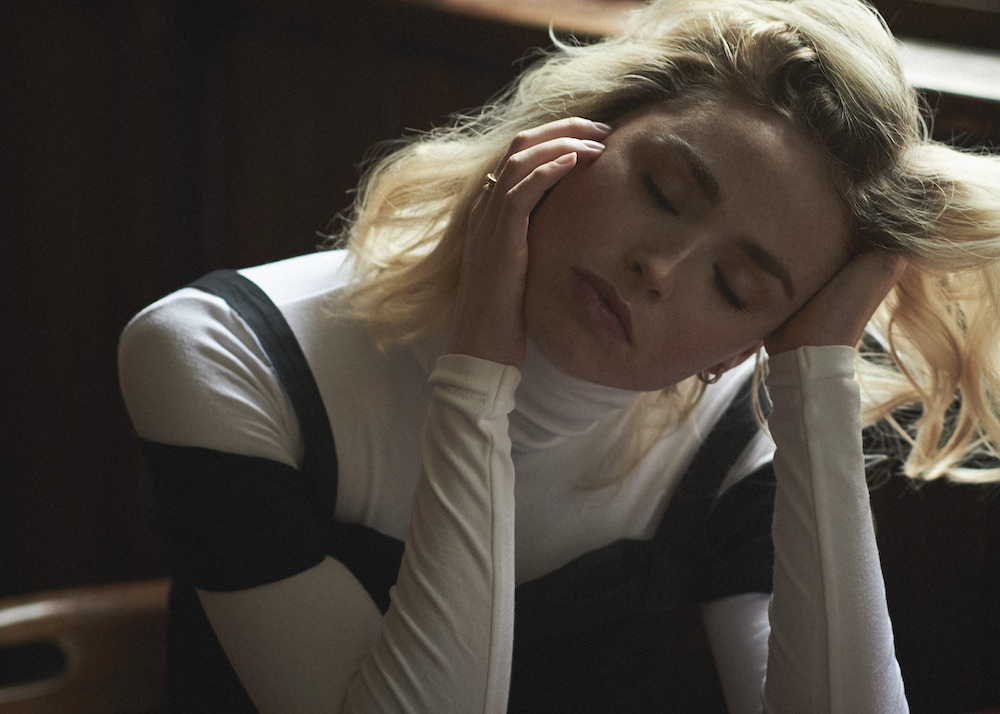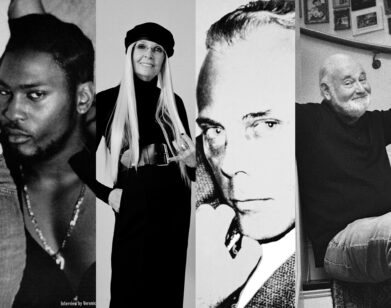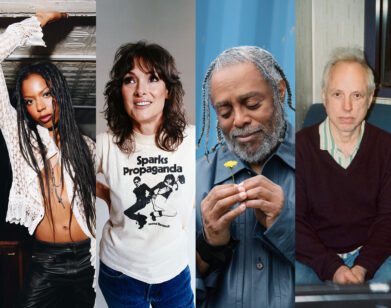Discovery: Freya Mavor
FREYA MAVOR IN LONDON, MARCH 2017. PHOTOS: JASON HETHERINGTON/SERLIN ASSOCIATES. STYLING: RACHEL BAKEWELL. HAIR: DAVID WADLOW/PREMIER USING PHYTO. MAKEUP: VICTORIA BOND/CAREN USING CHANEL ROUGE COCO GLOSS. STYLING ASSISTANT: SOPHIE KIRK.
In The Sense of An Ending, Freya Mavor shares a role with Charlotte Rampling. Adapted from the Julian Barnes novel of the same name, the film follows a middle-aged man, Tony, as he attempts to unravel the mystery of his first love, Veronica, and his deceased best friend, Adrian. In the present day, Tony and Veronica are Jim Broadbent and Rampling; in the haze of Tony’s memories of their university days, they are Billy Howle and Mavor.
Though they are almost 50 years apart in age, Mavor and Rampling have more in common that you might think. Both are U.K.-born actors (Mavor is Scottish) who have spoken French fluently since childhood and divide their professional time between the two countries. “I’ve always had quite a strong sense of what I wanted to do, what type of actor I wanted to be,” explains Mavor, who is visiting a friend in Brittany, France when we speak with her over the phone. “I have people that I’m lucky to work with, like Charlotte Rampling, who is incredibly willing to be so many things and not be sucked into the vanity or the pressure that can come with being an actress,” she continues. “She has a mental integrity in the roles that she does and is very unafraid to be seen … those actresses have always been hugely inspirational to me.”
Now 23, Mavor’s first professional acting role was in the cult British youth drama Skins when she was still a teenager. Americans might know her from Starz’s historical drama The White Queen, in which she played Princess Elizabeth. In France, she is a promising new talent, with roles in films like Yvan Attal’s Ils sont partout (2016) and Danièle Thompson’s Cézanne et moi, which stars Guillaume Canet and comes out in the U.S. April 7. Next, she’ll star in a biopic of Bert Trautmann, a former Luftwaffe paratrooper who became a British soccer star in the 1950s.
EMMA BROWN: I read that you decided that you wanted to become an actor after watching The Shining when you were little. Is that true?
FREYA MAVOR: Yes. That was a turning point, for sure. I was way too young to be watching that film, and I snuck in to watch it late at night by myself. I think it was just how much it affected me: I was completely petrified, but I was old enough, about eight or nine years old, to know that it was make-believe, that films weren’t reality. It got me thinking about the way of telling stories and how effective it can be and how it can really shape people and move people to such a degree. It got me questioning storytelling. I wanted to do what Jack Nicholson was doing, minus killing my entire family. Just being able to become someone so different or so extreme and to be able to make people believe in me becoming this other person. It definitely had a big influence on my wanting to act.
BROWN: Did you have nightmares afterwards?
MAVOR: For about a month I had nightmares of being in long corridors. It completely scarred me, but in a weirdly good way. It sparked a real curiosity for that medium of storytelling—the act of living a story as a means of telling a story.
BROWN: Did you get in trouble for it?
MAVOR: Oh yeah, completely, because then I had to tell my parents that’s why I was having nightmares constantly. I got in big trouble for that, but I was just being a naughty child.
BROWN: Your whole family is pretty artistic, right?
MAVOR: Definitely. Growing up in Edinburgh, which has the Fringe and lots of big festivals, I was being brought to a lot of plays and operas when I was young. My parents were very interested in cultural art. My dad is a screenwriter; he’s mainly a teacher and he teaches script writing. I was lucky to have been in a family that was not scared of the arts or being in a creative industry. They always supported that decision.
BROWN: You were pretty young when you auditioned for Skins, too.
MAVOR: Yeah. They did open auditions for the generation I was in and I was a big fan of the show before being in it. I would watch it religiously with my brother. I heard that they were doing open auditions, so anyone could have an opportunity, and that started the very strange process of how I ended up doing my very first job.
BROWN: Did you have an agent already or did you get an agent through that?
MAVOR: I had an agent before. I always knew that I wanted to get involved with acting in some way or another. When I was 15, I was a very keen teenager, and I sent lots of emails to agencies in London, just asking if they would consider speaking with me for five minutes about the industry and about being an actor. I contacted, like, 30 agencies, and most of them didn’t respond, I guess understandably, but Hamilton Hodell did. I don’t know, I think they thought it was sweet that I showed an interest. They agreed to meet me for five minutes if I was in London, and I ended talking to people throughout the agency and they suggested they might put me up for a couple of auditions to see how that would go and how I felt about it. I didn’t get any of those jobs, but they took a leap of faith and said they’d be willing to take me on as an actress. I’ve been with them for a long time and I really owe them a lot for taking a risk on someone who had never done anything and who was just interested in that world.
BROWN: In The Sense of an Ending, you share a character with Charlotte Rampling. Did you get to discuss the character together?
MAVOR: Yeah, we did. We were never on set at the same time, because we were never in the same scenes, but we had a communication via email beforehand just to give our ideas of who we thought Veronica was. After filming, I got to spend an evening with her in Paris because she agreed to by my mentor for a sort of celebration of emerging talent in French cinema. An evening where as actors in French cinema, you get to pick a mentor if they are willing and able and available, and they spend an evening with you and there’s a dinner. We got to properly meet then, and it was such an inspiring evening because she exceeded all my hopes of who she might be. She was the most incredibly wonderful person to talk to and ask advice from.
BROWN: Did you know that she was going to be playing Veronica in the present day when you signed on to the film?
MAVOR: Yes, I did. Her and Jim [Broadbent] had been attached to the project for a while and they had been trying to find a kind of young equivalent. I always knew it was her, which was a bit terrifying. I don’t think I really look like Charlotte Rampling when she was young because she was possibly the most attractive person in the universe. I was very pleasantly surprised when I got it.
BROWN: Have you ever done that before, shared a part with another actor where you play different ages?
MAVOR: No, I haven’t. It was really interesting. Beforehand, I watched a lot of other films of Charlotte’s to get almost an echo of her and her mannerisms—the way she holds herself and the way that she speaks, her intonation, her rhythm. Not, obviously, going into imitation, but just to get an essence of someone and the energy that they exude in numerous different roles. That was an interesting way of working I’d never explored.
BROWN: How come you speak French?
MAVOR: I speak French because when I was nine we moved to France, to a town on the west coast called La Rochelle. My parents were lucky at the time to have jobs they could move around with—my mum was an illustrator and my dad was still a bit involved with writing—and it had always been a dream of my mother’s especially to give us an experience of living in a different country and learning a different language and having a different culture. We moved just for a year and then things happened that meant I wanted to stay on, and we ended up staying there for four years. Then we moved back to Scotland.
BROWN: Do you have a separate French agent?
MAVOR: Yes, I do. I moved to France again by myself when I was 19. I moved to Paris and I found my French agent. At first, doing auditions in France was very hard and slow, but it eventually picked up after a wee while, after they got over the fact that I was Scottish, basically.
BROWN: I have a friend who is an actor who is half American and half French. He says that industry people in both countries have trouble coming to terms with someone who is fully bilingual.
MAVOR: [laughs] Yeah, I think it’s funny. It took a wee while for them to get their head around the fact that I wasn’t French and I don’t necessarily look French—I’ve got very pale skin and I’m very freckly, so I look quite Celtic. But the first French project I did really opened so many doors for me. That was a film that has a ridiculously long name, The Lady in the Car with Glasses and a Gun—La dame dans l’auto avec des lunettes et un fusil. It was with a very open director who had such a vision for the character that it didn’t matter to him that I hadn’t done anything in France before or that I was Scottish. He was just so interested in the role and how he imagined me in that film.
BROWN: And now you’ve done three French films.
MAVOR: Yeah, I’ve done three French films and a small sort of miniseries, almost like a web series, with Pierre Niney and various other French actors.
BROWN: When I speak French my voice goes up an octave. Do you find that?
MAVOR: Yeah, I find it fascinating. I’ve always been so intrigued by language and how it completely changes you—because of cultural context, because of humor. Everything is so different. I always find that I’m less sarcastic in France and maybe I’m a bit more shy and a bit more reserved, even more polite. My voice tends to go up quite a lot. I’d love to speak more languages just to discover who I become in a different language.
BROWN: Have you dubbed any of your English films?
MAVOR: I haven’t actually, and I would absolutely love to do that. I remember a French friend showing me like a little clip from Skins, the French dubbed version of it, and the girl who was dubbing me had a really high-pitched, squeaky voice. It was just so funny hearing someone else do it in my voice in a completely different way. I actually worked with a French director, Yvan Attal, who does the voice of Tom Cruise. Whenever anything of Tom Cruise’s gets dubbed he’s called up, because it becomes a recognizable voice.
BROWN: Had you already read the book when you got the script for The Sense of an Ending?
MAVOR: Yes. I’d actually read the book a year or two years before I read the script, and I absolutely loved it. I think I’ve read most of Julian Barnes’s books; he’s probably one of my favorite contemporary writers. Every time I read it, I rediscovered something about the characters or Veronica and there was something new to take from it. I must’ve read it about seven or eight times. It was so useful to discover more secrets about Veronica and make my own interpretations and fill in the gaps on my own. It’s a beautifully constructed novel.
BROWN: Veronica is the most interesting character in a way, because there’s just this huge time lapse in terms of what we know about her.
MAVOR: The thing I find so fascinating with Veronica’s character is that she’s always seen through Tony’s perspective, either as how he chooses to remember her when they were young in their first relationship, or how he wants to see her in the present day as this kind of elusive, mysterious figure. She’s not a character in her own right because she always colored with his ideas or his fantasies about her. It was so fascinating to make her in a character in her own right, to come up with what I thought had happened to her, what I think she’s gone through, so that she becomes real for me and not this image in someone else’s memory. I did a lot of work on the novel especially, and speaking to Ritesh [Batra], the director, he was always very open to discussing things. In terms of choices and what she’d been through as a character he always said that’s something that’s very personal to you and you guard it like a secret—what she chooses to tell people or not. I guess it was both working with Ritesh on all the scenes with Billy [Howle] and their story, and talking about Veronica, but then coming up with, and guarding it very personally, the stuff that I think happened to her. Inventing a life for her.
THE SENSE OF AN ENDING IS OUT NOW IN SELECT THEATERS. CÉZANNE ET MOI COMES OUT APRIL 7, 2017.







